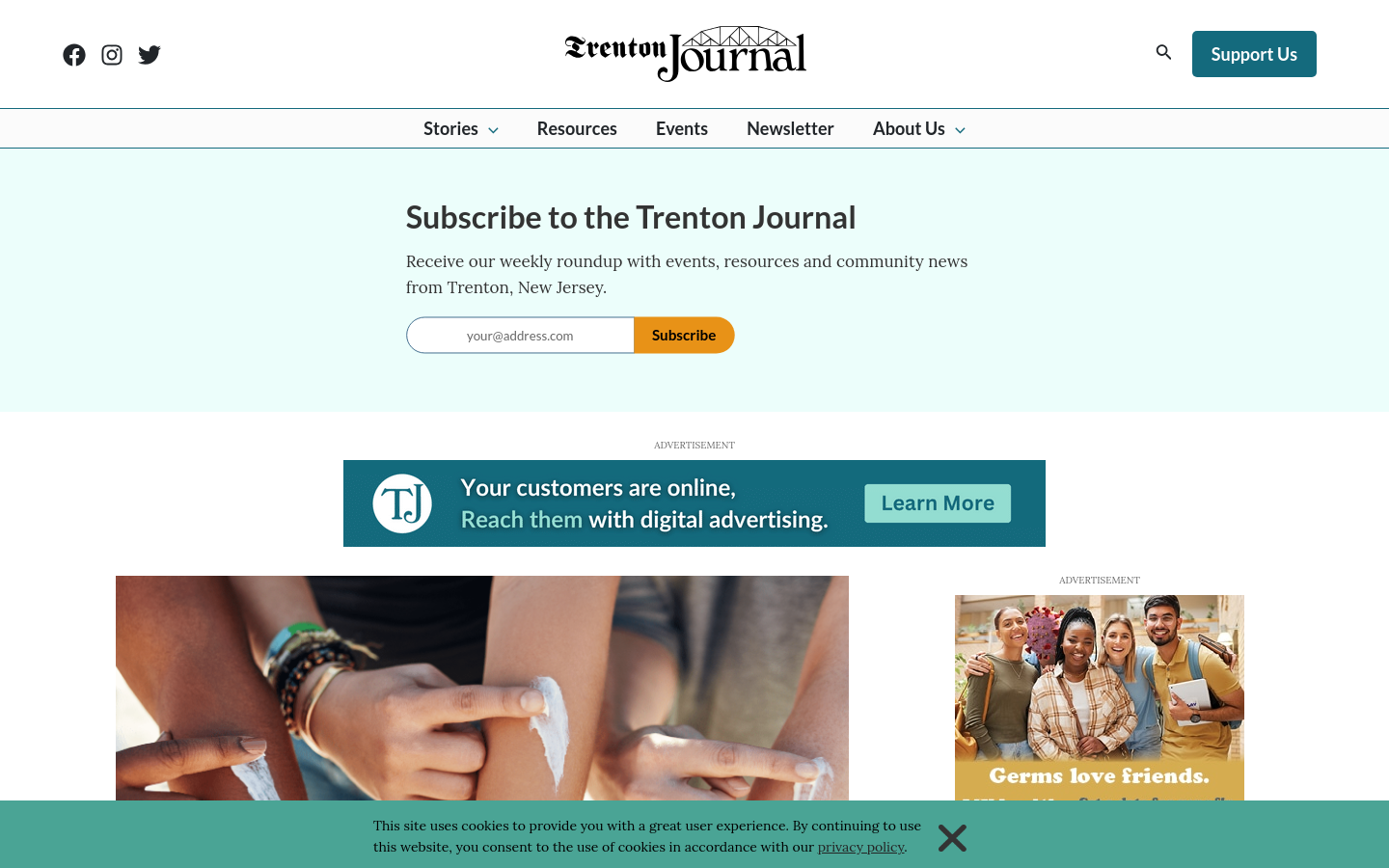Civic Tech Field Guide
Sharing knowledge and productively growing the fieldSearch 12458 projects
Showing 12458 Results

The Mesquite
San Antonio, TXThe Mesquite is a student-run media outlet for students to report on developmental and civic issues in the economically underserved areas of San Antonio, including rural areas surrounding the start-up campus of Texas A&M University–San Antonio. Its intent is to showcase the best work of its undergraduate students and to experiment with new directions in journalism education.

ITASCA COMMUNITY TELEVISION (ICTV)
Grand Rapids, MNICTV connects, informs, and empowers the community of Grand Rapids, Minn., through diverse media.
Burlington Beacon
Burlington, IAGuided by the motto “Local People, Local News,” the Burlington Beacon provides the community of Burlington, Iowa, and the surrounding area with reliable and timely news that truly reflects the lives and concerns of its readers. Each story is written by a local resident who has a deep understanding of and appreciation for the community and the editorial policies are driven by this knowledge rather than by corporate interests.

Aurora Sentinel Community Media
Aurora, COAurora Sentinel Community Media provides factual, trusted, nonpartisan news, investigations, and features about the Aurora region and its diverse community. The nonprofit corporation was created to grow a robust, thriving news organization with the capacity to cover the issues and interests of the greater community of Aurora.

El Informador Newspaper
Mount Pleasant, SCEl Informador Newspaper informs, engages, and empowers the Latino community in South Carolina through journalism that is trustworthy, accurate, culturally resonant, and impactful.

Ouray County Plaindealer
Ridgway, COThe Ouray County Plaindealer is the only trusted source of local news in a rural Colorado mountain community of roughly 5,000 residents. The Plaindealer’s journalists seek truth and report it, with the goal of informing the community with fact-based, nonpartisan articles. While maintaining high standards for accuracy and fairness, the Plaindealer produces quality journalism for the community, which would be a news desert without it.

Houston Herald
Houston, MOEstablished in 1878, the Houston Herald is the award-winning county seat weekly newspaper serving Texas County. In 2024, the Herald was judged one of the state’s top newspapers in its class in the Missouri Better Newspaper Contest.

The News-Gazette
Lexington, VAThe News-Gazette comprehensively provides the residents of the Rockbridge County, Va., area with local news and information in print and online, following the best practices of journalism to provide a forum to the community for the exchange of ideas and to be a force for positive change and understanding.

Carolina Public Press
Durham, NCCarolina Public Press is an independent nonprofit news organization dedicated to nonpartisan, in-depth, and investigative news built on the facts and context North Carolinians need to know. Its award-winning journalism dismantles barriers and shines a light on the critical overlooked and under-reported issues facing the state’s almost 10.7 million residents.

Montclair Local Nonprofit News
Montclair, NJMontclair Local Nonprofit News is an independent local news organization founded in 2017 with the mission to spark dialogue, objectively inform, and build community in Montclair through independent, in-depth, factual reporting on local issues and events such as schools, elected officials, institutions, businesses, restaurants, and culture.

JMPro Community Media
Swannanoa, NCJMPRO Community Media shares essential news and information, builds community connections, and celebrates local immigrant culture through a multichannel distribution strategy—including community radio, printed bulletins, and live reporting—as well as community reporter training. JMPRO Community Media bridges the digital divide, builds journalism and storytelling skills, and develops community leaders in underserved communities in Western North Carolina.

Radio Catskill
Liberty, NYWJFF Radio Catskill is an independent community voice of the Catskills and Northeast Pennsylvania, connecting listeners through locally focused and globally aware programming to inform, entertain, and inspire its communities and promote understanding among people of diverse social, cultural, economic, and political backgrounds.

Radio Indigena 94.1
Oxnard, CARadio Indigena’s mission is to unite and empower California's Indigenous migrant communities by delivering high-quality programming in Indigenous languages. Radio Indigena is committed to fostering equality, peace, democracy, and social justice while breaking down barriers of literacy and language.

The Riverside Record
Los Angeles, CAThe Riverside Record provide its neighbors with a platform to tell their stories themselves, prioritizing context and insight over hype and sensationalism and striving to connect people through a shared love for their communities. It holds those in positions of power accountable through in-depth, hyperlocal, and easy-to-understand reporting.

Shoresides
Wilmington, NCShoresides, a nonprofit digital news site in Wilmington, N.C., is dedicated to reporting on the intersection of racial justice, community, culture, and power in the region. Its mission is to serve as an active voice telling regional stories through journalism that reaches the BIPOC community while creating a living archive preserving the community’s collective history.

Project Optimist
Saint Michael, MNProject Optimist engages residents of greater Minnesota to help them collaborate across common divides, tackle seemingly intractable problems, and grow more optimistic about the future of their communities, region, and world by tapping Minnesota’s creative and independent talent to produce solution-focused stories and local art to inform and inspire.

The Michael I. Arnolt Center for Investigative Journalism is dedicated to educating students in investigative reporting techniques and creating provocative, original journalism for the public in Indiana and beyond. As a working newsroom, it strives to protect the vulnerable, expose wrongdoing, and act as a watchdog in Indiana and nationally.

BirminghamWatch
Birmingham, ALBirminghamWatch serves the civic good of Birmingham and Alabama by supporting journalism that makes a positive impact and encourages citizen engagement with fair, factual, unflinching, and focused news.

Planet Detroit
Detroit, MIPlanet Detroit produces quality climate, equity, health, and environment journalism in the public interest that centers grassroots voices, holds power accountable, spotlights solutions, and serves the community.

The Boston Korea
Boston, MAThe Boston Korea serves the Korean American community in Massachusetts, New Hampshire, and Rhode Island. Since its establishment in 2005, it has been a pivotal source of news and information, dedicated to addressing the needs and interests of this community.

Te Lo Cuento News Kansas City - St Joseph
Saint Joseph, MOTe Lo Cuento News Kansas City-St. Joseph empowers the Spanish-speaking community in the central United States by providing high-quality, reliable news and information in Spanish that is free from sensationalism. It is dedicated to addressing the unique needs and concerns of the Hispanic community, ensuring it remains well-informed about local, national, and international events.

Grice Connect
Statesboro, GAGrice Connect delivers timely and relevant news to the residents of Statesboro/Bulloch County, Ga., fostering connection and building social capital within the community. It provides comprehensive coverage of local events, issues, and stories that matter.

QCity Metro
Charlotte, NCQCity Metro produces news, content, and events that are culturally, politically, and economically relevant to Black communities in Charlotte, N.C.

Door County Knock
Egg Harbor, WIDoor County Knock advances the truth, centers, and drives understanding of critical issues that affect Door County residents’ lives. It also holds powerful institutions accountable to the people, including by investigating betrayals of public trust and other abuses of power.

CivicLex
Lexington, KYCivicLex is a nonprofit organization that is strengthening the civic health of Lexington-Fayette County, Kentucky.

Paragraph Ranch LLC / The Texas Spur
Spur, TXThe Texas Spur (founded 1909) is the flagship weekly print and online newspaper of an award-winning regional five-newspaper group. It covers local government, education, agriculture, courts, sports, health, and lifestyle across ten contiguous rural counties of West Texas that are underserved by other media.

HOY en Delaware
Georgetown, DEHOY en Delaware is a monthly publication serving the growing Hispanic population in Delaware, serving as a bridge of understanding among all inhabitants of the state.

The Trenton Journal
Trenton, NJThe Trenton Journal empowers and inspires residents living in and around Trenton, N.J., by filling in the information gaps through stories and solutions-based journalism.

Únete al canal oficial de la campaña Harris-Walz para recibir anuncios importantes, contenido exclusivo, y mucho más. (with 28k followers)

Deceleration
San Antonio, TXDeceleration is a nonprofit online journal producing original news and analysis responding to our shared ecological, political, and cultural crises. The outlet writes at the intersection of environment and justice — journalistically, academically, and creatively — with an emphasis on the the watersheds of San Antonio, South Texas, and the Gulf South.

Vermont Independent Media/The Commons
Brattleboro, VTVermont Independent Media is founded on the belief that independent journalism is critical for the functioning of democracy and is the lifeblood of the community.

New Mainstream Press
Bala Cynwyd, PANew Mainstream Press empowers and uplifts the Asian American communities in the Greater Philadelphia area through diverse, high-quality media platforms, including print publications—Metro Chinese Weekly, Metro Viet News, and PhillyGuide—and a dynamic WeChat channel with over 50,000 subscribers.

Boyle Heights Beat, a part of the L.A. Local News Initiative
Los Angeles, CABoyle Heights Beat is a Spanish and English bilingual community news project produced by youth, offering noticias por y para la communidad or “news by and for the community.” The community journalism program’s mission is to empower youth voices and address relevant issues through multimedia journalism and provide a platform for young people to report on stories that matter to them while giving them a voice in shaping the narrative of their neighborhood.

BoiseDev
Boise, IDBoiseDev strives to be an innovative and impartial local news source focused on original and transparent reporting. The outlet seeks to give a voice to those without power.

FunTimes Magazine, LLC
Philadelphia, PAFunTimes is committed to amplifying the Black diaspora community’s voices and untold stories in the Delaware Valley, as well as promoting cultural insights and experiences to ensure Black perspectives are accurately represented and celebrated.

The Triton's Call
Mangilao, GUThe Triton’s Call is committed to enriching the University of Guam community by providing a vibrant platform for student perspectives on current events, both on and off campus. It offers island-centered reporting that reflects the community’s unique narratives and cultures, empowering students with information and insights that are relevant, engaging, and deeply rooted in their local context.

Watermark Publishing Group
Orlando, FLWatermark is a multifaceted news company using opportunities and innovations to communicate and advance LGBTQ+ interests, with a corporate emphasis on professionalism while building strong relationships with its readers, customers, and community.

Democracy Fund program dedicated to bridging critical gaps to support the safety, strength, and sustainability of groups working at the frontlines of our democracy.

Midcoast Villager (Rockland Villager)
Camden, MEMidcoast Villager (Rockland Villager) tells the story of Midcoast Maine, igniting conversations, sparking discovery, and bringing the community together to help make it a better place for everyone.

KDLL
Kenai, AKKDLL provides enriching and trustworthy programming that supports a community of informed critical thinkers.

Black Iowa News
Des Moines, IABlack Iowa News, an independent digital and print news platform, is dedicated to producing high-quality journalism that highlights Black perspectives, showcases the Black community, and amplifies the voices of Black Iowans. The Black-led organization launched a quarterly statewide newspaper in 2023. With a circulation of about 10,000, the mission of the state’s only Black newspaper is “prioritizing, educating, and uplifting ourselves.”

The Badger Project
Madison, WIThe Badger Project is a nonpartisan journalism nonprofit that focuses on politics, campaign finance, government, and law enforcement in Wisconsin, with an emphasis on covering these things in rural areas and news deserts.

Easton Courier Community Journalism Project
Fairfield, CTThe Easton Courier Community Journalism Project provides high-quality local news coverage that builds trust and credibility within communities through timely, accurate, and substantive coverage of local politics, education, culture, and events. It is committed to educating and training the next generation of ethical journalists.

The Portager
Mogadore, OHThe Portager is the local news source of Portage County, Ohio. Its mission is to be a catalyst for ideas and action to help its community thrive.

Iola Register
Iola, KSFounded in 1867, the Iola Register serves Iola, Kan., and the surrounding areas with quality news and journalistic integrity. The Iola Register is committed to serving Allen County by being independent in all things, but radical in the pursuit of freedom, justice, and equal rights.

Latino News, LLC
Birmingham, ALFounded in 1996, Latino News is a free weekly newspaper that has remained one of the most effective communication bridges for the Hispanic community in Alabama. It delivers news in Spanish and educates and provides resources to the Latino community on such topics as immigration, Latin America, world news, health, sports, science and technology, entertainment, and more.

The Daily Catch
Red Hook, NYThe Daily Catch was founded on the premise that every community deserves the benefits of incisive, accurate, and sensitive journalism. As such, the Catch is dedicated to reporting on the news, personalities, and activities of people, schools, merchants, farms, and government in and around New York’s Hudson Valley towns of Red Hook and Rhinebeck.

Talon Marks
Norwalk, CATalon Marks is a public forum and the voice of the Cerritos College community, accurately portraying the happenings in and around the world, country, state and/or district that affect the everyday lives of its readers.

Shift Press
Houston, TXShift Press is a media organization that provides journalism training and news that encourages Houston youth civic engagement.

La Raza
Chicago, ILLa Raza informs, defends, educates, enlightens, and empowers the Hispanic community in Chicago through Spanish journalism and literature, outreach activities, and business opportunities while promoting the values of democracy, freedom, justice, diversity, equality, cultural heritage, and opportunity for all.


